 LIVE @
The Jazz Suite
LIVE @
The Jazz Suite
Wed
28th Nov 2007
'Swingin' Bassoon' Exclusive
CD Launch
Celebration - Gig 30
St Andrews Court
Wellington Street
THAME
OX9 3WT
Daniel Smith
Virtuoso Bassoonist
Unique Jazz Artist in Performance
In working with a jazz piano trio in order to adapt the bassoon to an all-jazz standards setting, Smith is extremely comfortable with the concept and the results, even if the instrument does not treat all of the Jazz Standards equally. For example, on Thelonious Monk's “Blue Monk,” the mournful sound of the bassoon is just perfect to demonstrate how well the concept works.
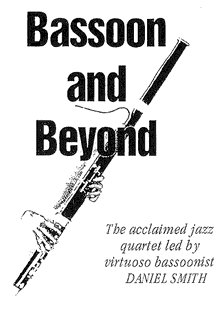
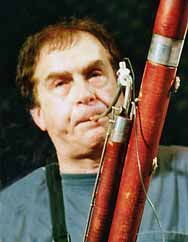 Dan
Smith's
Dan
Smith's
'Bassoon and
Beyond'
Jazz Quartet
- supporting artists
Jonathan Gee - Keyboard
Steve Rose - Double Bass
Winston Clifford - Drums
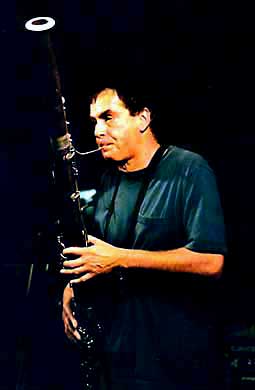 Daniel
Smith the leading pioneer
of the bassoon with his many critically acclaimed award-winning
recordings and live performances. As the most recorded bassoon
soloist in the world, his repertoire spans music ranging from
Baroque concerti to contemporary music including jazz, ragtime and
crossover. He is the only bassoonist performing and recording in
both the jazz and classical fields. Daniel Smith's unique career has
been profiled in Gramophone, the New York Times, Fanfare, Classical
Music, Musical Heritage Review, American Record Guide, Classic CD
and many leading European publications including The Times in
England. In the USA, his career was highlighted on PBS's "All Things
Considered'. In the UK, one of his recordings was the 'signature
tune' for BBC Radio 3 while BBC Radio 4 recently showcased his
career.
Daniel
Smith the leading pioneer
of the bassoon with his many critically acclaimed award-winning
recordings and live performances. As the most recorded bassoon
soloist in the world, his repertoire spans music ranging from
Baroque concerti to contemporary music including jazz, ragtime and
crossover. He is the only bassoonist performing and recording in
both the jazz and classical fields. Daniel Smith's unique career has
been profiled in Gramophone, the New York Times, Fanfare, Classical
Music, Musical Heritage Review, American Record Guide, Classic CD
and many leading European publications including The Times in
England. In the USA, his career was highlighted on PBS's "All Things
Considered'. In the UK, one of his recordings was the 'signature
tune' for BBC Radio 3 while BBC Radio 4 recently showcased his
career.
Daniel Smith's performances include jazz with his quartet 'Bassoon
and Beyond', classical recitals with piano, concertos with
orchestra, and highly popular programs divided between classical and
jazz, with music ranging from Vivaldi, Elgar, Mozart and Verdi to
Duke Ellington, John Coltrane, Charlie Parker, Sonny Rollins and
Dizzy Gillespie. Described as a 'phenomenon', he has been called the
'Gerry Mulligan of the Bassoon' in the world of jazz and the
'Galway' and 'Rampal of the Bassoon' in the world of classical
music, bringing his unique sound and style to concert series,
festivals and jazz clubs.
 Jonathan
Gee - a fine UK pianist with
allegiances to Keith Jarrett and McCoy Tyner - there are plenty of
signposts to the familiar, and the playing is exhilaratingly fresh. Has
worked regularly with US stars David Murray & Mark Murphy. He has
recorded 20 albums with British artists such as Bobby Wellins, Ed Jones,
Eddie Parker, Claire Martin, and US3, & has toured 16 countries with the
likes of Steve Williamson & Orphy Robinson. Recent work includes 3 tours
of Scandinavia with Ed Jones, Finnish trumpet star Mika Myllari & the
trio, & trips to Cameroon & Singapore with poet Lemn Sissay for the
British Council. Television appearances include BBC 2's "Jazz 606" & a
stint as Musical Director for guests such as Alison Moyet & Clive Rowe
on BBC 2's " Lesley Garrett Show". He was "most promising newcomer" in
the 1991 British Jazz Awards & is currently appearing as a
singer/pianist together with Dominic Alldis (also a singer/pianist) on a
UK tour. His international Quartet with Damon Brown will visited New
York, Israel & Spain in the spring of 2002. In recent years
Jonathan has also begun to develop his voice . With Dominic Aldiss he
has formed a duo in which they both play the piano and sing. The
repertoire features Ellington, LeGrand, Coward, Evans and Jobim
Jonathan
Gee - a fine UK pianist with
allegiances to Keith Jarrett and McCoy Tyner - there are plenty of
signposts to the familiar, and the playing is exhilaratingly fresh. Has
worked regularly with US stars David Murray & Mark Murphy. He has
recorded 20 albums with British artists such as Bobby Wellins, Ed Jones,
Eddie Parker, Claire Martin, and US3, & has toured 16 countries with the
likes of Steve Williamson & Orphy Robinson. Recent work includes 3 tours
of Scandinavia with Ed Jones, Finnish trumpet star Mika Myllari & the
trio, & trips to Cameroon & Singapore with poet Lemn Sissay for the
British Council. Television appearances include BBC 2's "Jazz 606" & a
stint as Musical Director for guests such as Alison Moyet & Clive Rowe
on BBC 2's " Lesley Garrett Show". He was "most promising newcomer" in
the 1991 British Jazz Awards & is currently appearing as a
singer/pianist together with Dominic Alldis (also a singer/pianist) on a
UK tour. His international Quartet with Damon Brown will visited New
York, Israel & Spain in the spring of 2002. In recent years
Jonathan has also begun to develop his voice . With Dominic Aldiss he
has formed a duo in which they both play the piano and sing. The
repertoire features Ellington, LeGrand, Coward, Evans and Jobim
John Fordham of the
Guardian said of Jonathan Gee "He has blossomed into a performer of
flexibility, resourcefulness and technical command to rival any of his
generation." Jonathan has released two albums with his own trio which
has appeared at Ronnie Scott's. He has played with many greats including
Joe Lovano, David Murray and Benny Golsen.
 Winston
Clifford is one of Britain's leading jazz drummers. Born
in September 1965 - a Virgo.
Winston
Clifford is one of Britain's leading jazz drummers. Born
in September 1965 - a Virgo.
In
1979 - Studied with ex-Tubby Hayes drummer Bill Eyden and in1985 studied drums with
Trevor Tomkins at Guildhall School of Music. Has played with many musicians
including Courtney Pine, Bheki Mseleku, Jason Rebello, Gary Husband, Pete King,
Dick Heckstall-Smith, Iain Ballamy, Leroy Osbourne, Ronnie Scott Band, Julian
Joseph, Andy Sheppard, Tony Remy, Steve Williamson Band, Jean Toussaint Band,
Slim Gaillard, Bobby Watson, Monty Alexander, Gary Bartz, Art Farmer, Archie
Shepp, Freddie Hubbard etc. Has appeared at many International Festivals &
recorded albums with Frevo, Roadside Picnic, Jean Toussaint, Andy Hamilton,
Brian Dee Trio, Harry Beckett Quintet & Jan Ponsford. Appeared on Channel 4, BBC
2 & ITV as well as radio broadcasts. He has worked with Courtney Pine,
Bheki Mseleku, Jason Rebello, Iain Ballamy, Julian Joseph, Andy Sheppard, Jean
Toussaint, Orphy Robinson, Bobby Watson, Monty Alexander, Birelli Lagrene and
Joey Calderazzo. He has performed in New York and Bombay with Carmen Lundy and
is featured on her latest album, Old Devil Moon.
Jazz Eddie - I have watched Winston at many jazz performances and he is truly one of the great listening drummers and responds positively to every nuance or direction the music takes and delivers superbly structured solos with drive, intellect and humour. Less is more with Winston and I concur. He also delivers a mean vocal interlude when allowed to! Don't miss him he is a truly astounding simpatico drummer and way ahead of the standard game.
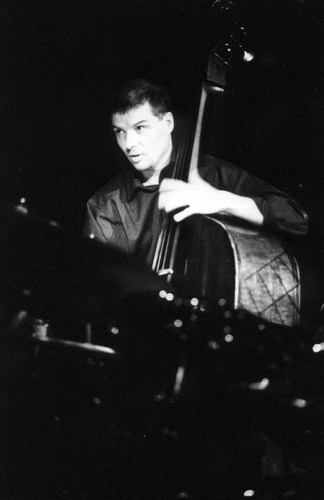
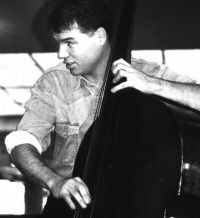 Steve
Rose 46 plays
double bass, piano & keyboards, & has worked with Paul Weller, Tim Hagans, Tiny
Tim, Eddie Parker, Jacqui Dankworth, Tommy Chase, Roland Gift & Samantha Fox
amongst others.
Steve
Rose 46 plays
double bass, piano & keyboards, & has worked with Paul Weller, Tim Hagans, Tiny
Tim, Eddie Parker, Jacqui Dankworth, Tommy Chase, Roland Gift & Samantha Fox
amongst others.
He has worked extensively in the theatre & in contemporary dance and has
composed & performed music for leading companies such as London Contemporary
Dance Theatre, Amici, The David Glass Ensemble & Candoco, throughout the world.
Recently he was Musical Director at the Royal Opera House, Covent Garden working
with members of the orchestra & young people with autism.
He also works as a film & TV composer and is a proud father to Laura and Thomas.
For Booking
Enquiries on the "Bassoon and Beyond" Jazz Quartet
Contact
E-mail or Phone 01844 353117
E M Fowler
Download This Poster 636Kb
Recordings - Jazz CD's
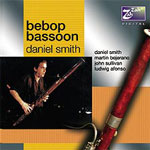 Daniel
Smith has invested a lot of time and energy to bring the repertoire
of the bassoon into ragtime, jazz and contemporary music. Smith has
recorded such titles as Bassoon Bon Bons, Bravo Bassoon
and The Swinging Bassoon, as well as performances of Gunther
Schuller's “Concerto for Contrabassoon and Orchestra” and Steve
Gray's “Jazz Suite For Bassoon and Orchestra.” As a result of his
many and diverse bassoon recordings, he has received considerable
media attention for his efforts. In 2005, composter/arranger Robert
Farnon dedicated his final composition to Smith: “Romancing the
Phoenix,” a three-movement bassoon concerto with rhythm section and
symphony orchestra in a jazz setting.
Daniel
Smith has invested a lot of time and energy to bring the repertoire
of the bassoon into ragtime, jazz and contemporary music. Smith has
recorded such titles as Bassoon Bon Bons, Bravo Bassoon
and The Swinging Bassoon, as well as performances of Gunther
Schuller's “Concerto for Contrabassoon and Orchestra” and Steve
Gray's “Jazz Suite For Bassoon and Orchestra.” As a result of his
many and diverse bassoon recordings, he has received considerable
media attention for his efforts. In 2005, composter/arranger Robert
Farnon dedicated his final composition to Smith: “Romancing the
Phoenix,” a three-movement bassoon concerto with rhythm section and
symphony orchestra in a jazz setting.
In working with a jazz piano trio in order to adapt the bassoon to an all-jazz standards setting, Smith is extremely comfortable with the concept and the results, even if the instrument does not treat all of the titles equally. For example, on Thelonious Monk's “Blue Monk,” the mournful sound of the bassoon is just perfect to demonstrate how well the concept works. However, when he tackles Horace Silver's “Sister Sadie,” the funky classic sounds too artificial. The ballad and blues entries, like the Miles Davis “All Blues” or the Ellington piece “In a Sentimental Mood” are sympatico with the use of bassoon as a lead instrument—as is the case with such bebop classics as “Killer Joe,” the Parker/Gillespie tune ”Anthropology” and Sonny Rollins' “Doxy.” In an interesting departure from this format, Daniel Smith provides an experiment in adapting Coltrane's “Up Against the Wall” to fit a piano-less group of bassoon, bass and drums. Otherwise, Smith is well supported by the trio of Martin Bejerano (piano), John Sullivan (bass) and Ludwig Afonso (drums)
Track listing: Killer Joe; Anthropology; Blue Monk; Sister Sadie; In A Sentimental Mood; All Blues; Doxy; Up Against the Wall; Birk's Works; Sticky Wicket.
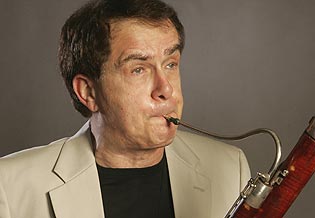
Dan on Jazz Improvisation on the Bassoon
I would like also
to bring up the subject of unusual and different music which can be
performed on the bassoon and also jazz. Ragtime if executed with the
right feeling can sound very natural on the instrument, as does a
large amount of 'crossover' material including transcriptions of
music normally performed on other instruments as well as orchestral
pieces. As for playing jazz on the bassoon several years ago, Steve
Gray composed a work for me entitled 'Jazz Suite' which I had the
honour of performing with the Welsh Chamber Orchestra. The piece
contained improvisational spots and which forced me to plunge in and
get serious about playing real jazz on the instrument. I was already
a virtuoso so to speak but all of my technical skills were of no
help whatsoever in learning how to play jazz in a serious way. I had
to methodically learn to play extended chords and scales from top to
bottom on the instrument and in all keys. This included many scales
and chords which do not appear in classical music. And then to place
all ideas exactly where the underlying chords are heard and of
course to 'hear' musical ideas many measures before you execute
them. This took me about four years to accomplish and along the way
my arms became very sore and stiff from the effort. But then
suddenly the ideas flowed and the soreness stopped... everything
just flowed! All the musical ideas made sense and can now perform a
full two hour jazz concert without using any music and with a
repertoire of nearly one hundred jazz pieces to pick from including
bebop, swing, Latin, blues, ballads, etc.
Finally, the bassoon must be amplified when performing jazz, otherwise it would not be heard above a rhythm section, let along a full symphony orchestra. I have a special microphone attached to my crook/bocal which makes this possible. When Robert Farnon found this out, he was much relieved knowing that his music would be clearly heard above the orchestra in his bassoon concerto, And as for developing a jazz style on the instrument, there are no real role models from the past to learn from such as Armstrong, Gillespie or Davis on trumpet or Parker, Getz or Rollins on saxophone. It is all pioneering stuff and I am very pleased to be involved in such ground breaking efforts and of course with the bassoon concerto of Robert Farnon as a fitting memorial to his memory and talent.

. Daniel
Smith's
latest recordings, BEBOP BASSOON and THE SWINGIN' BASSOON
are to be released on the Zah Zah label. Featuring a top US rhythm
section (pianist Martin Bejerano, bassist John Sullivan and drummer
Ludwig Afonso), the two CDs were recorded 'back-to-back' and up
until now have been only available from Daniel's management where
they were enthusiastically received by jazz critics worldwide.
Daniel
Smith's
latest recordings, BEBOP BASSOON and THE SWINGIN' BASSOON
are to be released on the Zah Zah label. Featuring a top US rhythm
section (pianist Martin Bejerano, bassist John Sullivan and drummer
Ludwig Afonso), the two CDs were recorded 'back-to-back' and up
until now have been only available from Daniel's management where
they were enthusiastically received by jazz critics worldwide.
THE MUSICIANS
MARTIN BEJERANO: PIANO -
urrently member of the Roy Haynes band. Performed with: Russell Malone, James Moody, Ira Sullivan, Marcus Printup and many others. Major jazz festivals including those of Playboy, Montreal, Aspen, Ravinia, Sedona, Big Sur, Lincoln Center, Bahia, Charlie Parker. Jazz clubs appearances include: Birdland, The Blue Note, Jazz Gallery, Sunset Club (Paris), Jazz Showcase, Dakota. Recordings on various labels.C
JOHN SULLIVAN: BASS
Currently member of the Roy Haynes band. Performed with Joe Lovano, Roy Hargrove, Mike Manieri, Louis Hayes, David Sanchez, Bill Stewart. Jazz club venues and festivals include: The Jazz Gallery, Village Vanguard, The Blue Note, The Knitting Factory, Smalls, Lincoln Centre. Recordings on various labels.
LUDWIG AFONSO: DRUMS
One of New York's premier jazz drummers, currently with Spiro Gyra. Featured with Bob Berg, Ira Sullivan, Nestor Torres, Sammy Figueroa, Eddie Rivera, Hector Martianon, Donny McCaslin. Ensembles include CJB Concert Jazz Band and the Bop Brothers. Recordings on various labels.
Playlist
- Well You Needn't [Thelonious Monk]
- Hay Burner [Count Basie/Sammy Nestico]
- Scrapple from the Apple [Charlie Parker]
- St. Thomas [Sonny Rollins]
- I'm Getting Sentimental Over You [Washington/Bassman]
- Summer Samba [Marcos Valle]
- Out of Nowhere [Eddie Heyman]
- Mood Indigo [Duke Ellington]
- Home At Last [Hank Mobley]
- I Remember You [Schertzinger/Mercer]
-
A Night In Tunisia [Dizzy Gillespie/Frank Paparelli]
Reviews -
Bassoonist Daniel Smith switch hits from classical to swing to hard bop on this rewarding studio set. Other than some choice solos by pianist Martin Bejerano, the quartet stays in the background, providing support to Smith’s amazingly fluid lines, which shine forth through a set of jazz standards. You can just imagine saxophonist Charlie Parker on bassoon during the band’s take on “Scrapple From The Apple.” Here and throughout, Smith’s spiky phrasings are balanced by brisk runs fortified by lots of pop, zip and seemingly effortless control.
Enhanced by a varied mix of tunes, the album is much more than a novelty excursion. On “Summer Samba,” the leader is well paired by Bejerano’s upper register choruses, the duo's blithe unison passages running atop a delicate samba pulse. Smith’s imaginative and technically impressive performances are complemented by his band-mates’ deft touch and judicious use of dynamics. - Glenn Astarita - allaboutjazz
I'll admit
something, I was not quite prepared for this album that was
called The Swingin' Bassoon (Zah Zah/Guild). Can a bassoon
swing, I found myself asking, and would I be surprised to
hear one? I was very surprised.
Daniel Smith
has a classical background, but
knows that if you have the heart and determination, you can
make any instrument fit into the jazz mould, especially when
in jazz the moulds are destroyed and remade on a regular
basis. Jazz has often flirted with classical music and
instruments, as musicians have wanted to test the music and
their own limits. For the most part those experiments have
worked very well, and with Smith it works superbly.
Smith's bassoon begins the album, and at first it sounds
like a classical recording. It takes about 25 seconds before
he and the band break it down, as they do in "I'm Getting
Sentimental Over You". Immediately you sense that there's a
different dynamic going on, but it works. Smith gets into a
groove by playing Monk's "Well You Needn't", and the
creativity continues throughout, with creative renditions of
songs by Duke Ellington, Dizzy Gillespie,
Sonny Rollins, Charlie Parker (you have to hear
"Scrapple From The Apple" to believe it), and Hank Mobley.
Helping out Smith on the album are Ludwig Afonso
(drums), John Sullivan (bass), and Martin Bejerano,
who can definitely read all of Smith's mannerisms in the
studio and also get to strut their stuff as they back him
up. The piano work of Bejerano was very impressive and
reminded me a bit of McCoy Tyner.
The Swingin' Bassoon sounds like one of those after-hours
albums where everyone has gone home and you're in it for the
spirit of the jam and the people in the room jamming with
you. A bassoon may not be the first instrument one thinks
about, but if it's there and a musician can play, bring it
on. Smith brings his best to the table and accomplishes his
mission by making the unconventional sound like it is part
of the norm. John Book
Coming into jazz originally from a
classical background, this
CD
caught my eye right away. I've always leaned toward jazz
played on some of those instruments of the symphony which
are not regarded as central to jazz expression - violin,
French horn, cello, oboe. Well, the bassoon is only a rung
down from the oboe, and is probably one of the most
difficult wind instruments to play (along with the French
horn). This is not the first time the lengthy fellow from
the woodwinds has been called upon to swing, but there
hasn't been much of that chamber jazz sort of thing lately,
so this disc is most welcome as far as I'm concerned.
Zah Zah is an Arabic word used to describe something that
shines brightly; it can also refer to something very good.
This is a new sub-label of the Swiss label Guild and I'm
ready to call it very good. Bassoonist Smith allows that
the classical performer has to get rid of all preconceived
notions about how to play the instrument if one wants to
make jazz swing with it. It's probably a similar challenge
on the French horn. Smith's quartet is set up just like a
typical jazz quartet featuring tenor sax, but the sound is
worlds different.
The tunes with a bit of the humour that jazz delivers so
well seem to come off the best. Monk's
Well You Needn't is
perfect for the instrument, and will bring a smile to any
jazz fan for sure. The arrangement is quite intriguing with
a workout for the bassoon not that different from some
Vivaldi concerto. (Vivaldi Meets Monk - now
there's an interesting idea...Smith recorded all 37 Vivaldi
concertos for the ASV label, by the way.) Others tracks in
similar lighter vein are Summer Samba, Sonny
Rollins' St. Thomas, and Dizzy's A
Night in Tunisia, which closes out the 11 tracks.
Scrapple from the Apple
starts with quite a feat - Smith copying note for note
Charlie Parker's own sax solo! Great fun all 'round.
- John Sunier
The bassoon is primarily relegated to providing background
colours within a symphony orchestra, but much like the late
Eric Dolphy
turned the bass clarinet into a lead instrument in a small
group jazz setting, Daniel Smith intends to establish his
ungainly woodwind as a jazz instrument. Smith's second
CD as a leader for the English label Zah Zah features
pianist Martin Bergerano bassist John Sullivan and
drummer Ludwig Afonso , who make up a potent rhythm section.
Smiths programme is an ambitious one, digging into
standards, swing, bop, hard bop and more. The ballads and
slower standards work best, allowing Smith to insert more
space between notes. But with faster tempi in pieces like
"Scrapple From the Apple" work against him, simply
because it is hard to for him to articulate when switching
from one note to another when they are close together,
unlike the bass clarinet, which can better project sound
without blurring the distinctiveness of each note. In any
case, Smith
proves his point that the bassoon has more potential than
simply being relegated to providing background colour.
~Ken Dryden, All Music Guide
Bassoon-focused covers of
Swing chestnuts may at first seem foolhardy, if ballsy. Yet
Smith has already lugged his ax into the studio to record a
set of Bop tunes on bassoon, so this is a more snug, if
still daring, fit. Aside from an obscure Hank Mobley tune
(“Home at Last”) the set list is not that adventurous, with
Tommy Dorsey, Johnny Mercer, Duke Ellington, Basie, and
Charlie Parker represented by more or less signature tunes.
The take on Parker’s “Scrapple in the Apple” deserves props
just because the song itself is so damn challenging no
matter the instrument. For the most part, though, this is
what you might expect: straight-ahead swing arrangements,
but with bassoon. Drummer Ludwig Alfonso sure does swing,
and John Sullivan on bass anchors the tunes. While at first
listen, each song kicks in with the familiar structure of
swing with the jarring addition of the bassoon, making each
track walk a tight-rope right off the bat: will this really
swing, or is this a novelty? Smith’s chops and warm
knowledge of these classics does make them swing, and while
there is humour in his lines, it does not come
unintentionally or as a gimmick. This is a sincere set, if
one that takes your ears some time to really dig it. --
Mike Wood (14 August, 2007)
 Visit
the Daniel
Smith
website to sample his CD's
Reviewers
Click Here
to
ask us for CD and Press Kit.
Visit
the Daniel
Smith
website to sample his CD's
Reviewers
Click Here
to
ask us for CD and Press Kit.
 Bring
some extra cash to buy your Memento CD's of these Stars and get them Autographed
Bring
some extra cash to buy your Memento CD's of these Stars and get them Autographed
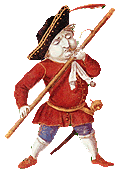
Bassoon - Woodwind Instrument
The beginning of the bassoon is similar to the
oboe.
The bassoon itself first appeared about 1650, and by the end of the
1700’s, it had from 4 to 8 keys.
During the 1800’s, many people experimented
with improving the fingering of the bassoon.
Most of the changes helped the
fingering, but made the tone of the instrument suffer.
The
Heckel
family of Germany managed to improve the fingering of the bassoon
without damaging its tone.
Many professionals today play bassoons made by the Heckel Company.